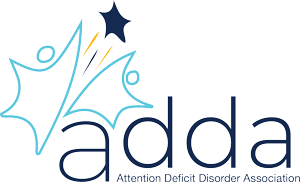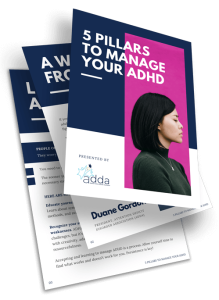
15 Good Work Habits for Adults with ADHD: Boost Productivity and Career Success
Small habits have big power. They shape both your daily life and your career success.
Simple routines to reduce distractions, stay organized, and track deadlines might seem small. But they can significantly improve how you work, especially if you have adult ADHD.
Making incremental, intentional adjustments to your routine is the key to building good work habits. Over time, these add up, helping you do your best work consistently.
What Are Work Habits?
Work habits are the consistent behaviors, routines, and systems you use to get your work done. They affect how you:
- Plan your schedule and organize your workspace
- Meet deadlines and handle your workload
- Focus during meetings and contribute effectively
- Communicate with coworkers and collaborate on tasks
Over time, good habits also help you build work relationships and grow into leadership roles.
Why Positive Work Habits Matter
Research shows that adults with ADHD often face more challenges in the workplace compared to their peers.[1] These challenges come from ADHD symptoms like getting distracted easily, trouble planning, forgetting things, and acting on impulse.
Good workplace habits help you thrive, not just survive. They boost your productivity, help you meet deadlines, and lower stress. Plus, habits keep you on track even when you’re tired or unfocused, so you won’t need to rely on last-minute rushes.
The Compound Effect of Daily Habits
Big changes start with small, regular actions that grow into habits.
Choosing to repeat helpful actions might seem small at first. But with time, they become automatic and change how you work for the better.

15 Effective Work Habits to Boost Your Performance
If you have ADHD, you might struggle with planning, organizing, focusing, and meeting deadlines.
Below are 15 good work habit examples tailored for adults with ADHD. These habits help improve focus, reduce overwhelm, and support long-term success:
1. Start Your Day with a Routine
A morning work routine cuts down on mental overload and decision stress. Begin with easy tasks like checking emails or tidying your desk.
You can also review your daily to-do list as part of your morning routine, where you list your tasks and mark your priorities for the day.
2. Set Clear, Achievable Goals
Unclear goals make it hard to start. You need specific, measurable goals you can actually reach.
“I want to be more productive” is too vague. “I will answer all emails before lunch” is much clearer.
Clear goals give you direction and let you see your progress.
3. Manage Time Intentionally
Individuals with ADHD often struggle with time blindness, which makes it difficult to sense the passage of time.
Try these strategies to manage your time better:
- Placing a physical timer or clock in front of you
- Time-blocking your day, which allows you to divide it into several blocks dedicated to specific tasks
- Utilizing the Pomodoro technique, which involves alternating between time blocks of focused work and short breaks
These methods help structure your day and track how you spend your time.
4. Prioritize Deep Work Over Busywork
Juggling multiple tasks may feel productive, but it can slow you down and lead to more mistakes.
Research shows that multitasking can impair your ability to retain information, increase stress, and negatively affect concentration and mood.[2]
Instead, focus on just one task. Keep only what you need on your desk and close extra tabs or programs. Try setting aside blocks of time for each task.
5. Practice Proactive Communication
Good work habits include clear, timely communication. Ask questions to understand what’s expected, and reply to messages promptly.
If messages come while you’re focusing deeply, don’t break your flow. Just note them down and respond after finishing your current work.

6. Take Breaks to Reset Your Brain
Regular breaks aren’t optional. They’re necessary for staying productive and focused.
Stepping away from your work, especially for movement-based breaks like a quick walk or some light stretching, can help reset your mind and boost your energy.
You can also set reminders to prompt you to take a quick break every hour or so.
7. Stay Organized (Your Way)
There is no one-size-fits-all method for staying organized. Some examples of ways to stay organized include:
- Color-code your tasks based on urgency or category
- Use a to-do list or ADHD planner to track daily tasks
- Keep a calendar to plan ahead and track deadlines or meetings
- Set reminders or alarms for important tasks
- Declutter your workspace regularly to reduce distractions and increase focus
Feel free to experiment with different techniques until you find what works best for you.
8. Follow Through on Commitments
Reliability is one asset that will make you stand out in your workplace.
When you promise something, try your best to deliver. If you’re struggling, speak up early. This builds trust with coworkers.
9. Keep Learning and Improving
Make learning an ongoing habit, not a one-time event.
Read industry articles, take quick courses to build skills, and ask for feedback from others.
Because the ADHD brain craves novelty, continuous learning is an excellent way to stay mentally engaged while building your knowledge, skill set, and value.[3]
10. Show Up on Time (or Communicate If You Can’t)
Being punctual is a key habit that demonstrates respect for others’ time and fosters trust.
Use alarms or calendar reminders to stay on schedule and keep track of important dates. If you’re running late or need to reschedule, send a quick message to show professionalism.

11. Stay Solution-Oriented
When problems come up, focus on solutions instead of complaints.
Ask yourself: “What’s one step I can take now?” List possible solutions and compare their pros and cons.
The more you practice problem-solving, the more natural it becomes.
12. Limit Distractions and Manage Notifications
Distractions can ruin your focus. Turn off extra notifications, keep your workspace tidy, and focus on one task at a time.
You can also seek workplace accommodations, like a quieter workspace or noise-canceling headphones, to reduce distractions and maintain focus for longer.
13. Reflect on Your Progress Weekly
Take 10 minutes each Friday to review your week. Write down what worked well and what didn’t. Think about ways to work better next week.
This weekly habit keeps you accountable and helps improve your work habits.
14. Protect Your Work-Life Boundaries
Set clear lines between work and personal time to avoid burnout. Sign off when your workday ends, don’t check work emails at home, and let others know when you’re available.
Guarding your personal time helps you rest and work better when you’re on the job.
15. Show Gratitude and Recognition
Acknowledging others’ efforts can build trust, boost morale, and create a more supportive work environment.
Make appreciation a daily work habit—send a quick thanks, offer a compliment, or praise a teammate during meetings.
How to Build and Maintain Effective Work Habits
Building work habits can be challenging with ADHD. These strategies will help you create lasting habits:
Start Small and Stack Habits
If you want to improve how you work, start with one habit at a time. Once that habit becomes automatic, you can stack another one on top of it.
For example, if you start writing a morning to-do list regularly, later add checking emails to that routine.
This “habit stacking” builds routines gradually without overwhelming you.

Use Environmental Design
Your workspace can help or hurt your habits. Small changes to your environment make good habits easier to maintain.
Try placing a timer on your desk or using apps that block distractions during work time.
Track Your Habits (Without Judgment)
Record your habits in a journal, app, or calendar.
Don’t aim for perfection. Experiment with different workplace habits, make small changes, and note what works best for your ADHD brain.
Be Patient: Habits Take Time to Form
Research shows new habits take about 2 to 5 months to form. Sometimes it can take nearly a year.[4]
This highlights the importance of patience and consistency. Building lasting habits isn’t about being quick or perfect. It’s about showing up and being willing to try again when you face setbacks.
Positive Work Habits are Essential for ADHDers
Effective work habits aren’t just nice to have – they’re crucial tools for adults with ADHD.
Whether you struggle with focusing, remembering details, or planning, good work habits equip you to manage ADHD symptoms, perform at your best, and thrive in your workplace.
Want to learn more about how to overcome ADHD-related challenges in your workplace? ADDA+ offers expert-led resources, courses, and webinars to help you understand ADHD better and regain control over your daily life.
References
[1] Adèle Hotte-Meunier, Sarraf, L., Bougeard, A., Bernier, F., Voyer, C., Deng, J., Asmar, S. E., Stamate, A. N., Corbière, M., Patrizia Villotti, & Geneviève Sauvé. (2024). Strengths and challenges to embrace attention-deficit/hyperactivity disorder in employment—A systematic review. Neurodiversity, 2. https://doi.org/10.1177/27546330241287655
[2] Halim, T., & Halim, S. (2023). Multitasking and Its Impact on 21st Century Professionals. ResearchGate, 42(03-2023). https://doi.org/10.17605/OSF.IO/AZDRW
[3] Anne-Laure Le Cunff. (2024). Distractibility and impulsivity in ADHD as an evolutionary mismatch of high trait curiosity. Evolutionary Psychological Science, 10. https://doi.org/10.1007/s40806-024-00400-8
[4] Singh, B., Murphy, A., Maher, C., & Smith, A. E. (2024). Time to Form a Habit: A Systematic Review and Meta-Analysis of Health Behaviour Habit Formation and Its Determinants. Healthcare (Basel, Switzerland), 12(23), 2488. https://doi.org/10.3390/healthcare12232488





